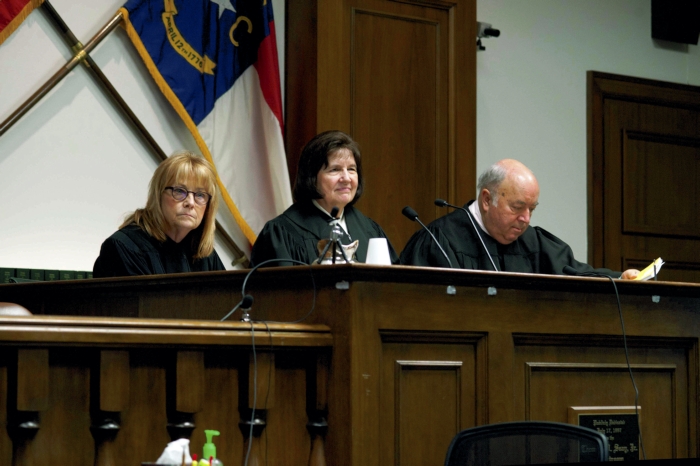Colin Campbell: Rigging the NC courts? Not necessarily
Published 6:11 pm Tuesday, June 26, 2018

- North Carolina Court of Appeals judges Linda Stephens, Linda McGee and Robert Hunter take their place as Court of Appeals convened at the Rowan County Courthouse for the first time in 2015. Jon C. Lakey/Salisbury Post
RALEIGH — Get ready to hear this talking point from Democrats throughout election season: Republicans, they argue, are trying to “rig the courts.”
The claim is an oversimplified exaggeration at best and a falsehood at worst, but Democrats have evidently found it polls well. They’re betting most voters won’t have the time or interest to dig into the complex details of GOP changes to how we select judges.
While Republicans are indeed hoping to get a few more judges from their party on the bench, some objectively good ideas are getting drowned out in the legislature’s hyperpartisan shouting match.
Let’s start with the effort to redraw judicial districts. Republicans argued that the districts needed to be updated to address population disparities: Some districts, such as Mecklenburg County, had gotten so large that voters were responsible for elected dozens of judges. It’s almost impossible to make an informed decision with so many contests on the ballot.
In a legislature where bills sometimes get enacted within 48 hours of introduction, this proposal got some serious vetting: Months of public hearings and multiple sets of draft map proposals.
When it was all over, legislators couldn’t agree on a statewide districting plan and instead scaled back to drawing new districts in Wake, Mecklenburg, Pender and New Hanover counties. Smaller districts will mean fewer judicial races on the ballot, giving voters more opportunity to research the candidates.
But were the districts gerrymandered to favor Republicans? Nope. Based on past election results, only one of eight Mecklenburg districts and one of five in Wake would give the GOP a slight advantage. The rest are almost certain to elect Democrats.
Still, the bill was vetoed by Gov. Roy Cooper, who waited until after 9 p.m. on a Friday to deliver the veto to the Senate clerk’s home — ensuring the bill couldn’t become law before candidate filing, and potentially laying the groundwork for a lawsuit over the last-minute timing of the new districts.
Another proposal from Republicans — a constitutional amendment changing how judicial vacancies are filled — could be a better shot at adding more GOP judges, assuming the party retains control of the legislature.
The ballot question would ask voters if they support “a nonpartisan merit-based system that relies on professional qualifications instead of political influence.” Ballots wouldn’t mention that the plan is essentially a power shift from the governor to the legislature.
The governor currently has sole responsibility for appointing for vacant judicial seats, something Sen. Warren Daniel, R-Burke, calls “the most undemocratic process we could have.” He correctly points out that governors from both political parties have used the power to give jobs to their friends and colleagues and reinstate judges who were voted out of office.
Daniel’s idea to create a “Nonpartisan Judicial Merit Commission” would be an improvement — if it’s done right. But the constitutional amendment unveiled last week treats the commission as just a human resources department, determining which candidates meet basic qualifications and forwarding those findings to the legislature. The legislature would then pick two candidates from that list and the governor would appoint from that list of two.
Under the current power dynamics, that means Cooper would probably have to pick between two Republican friends of legislative leaders. Still, a few tweaks to the proposal could make it a truly nonpartisan process instead of a power grab.
Lawmakers could simply empower the nonpartisan commission — made up of appointees from the legislature, governor and Supreme Court chief justice — to pick the two best candidates, regardless of party affiliation. Then the governor could make the final selection for statewide judicial seats, and the legislature could handle vacancies in local courts.
Make the proposed system truly nonpartisan, and legislative leaders might even deprive the Democrats of their “rigging the courts” campaign talking point.
Colin Campbell is editor of the Insider State Government News Service. Follow him at NCInsider.com or @RaleighReporter. Write to him at ccampbell@ncinsider.com.

